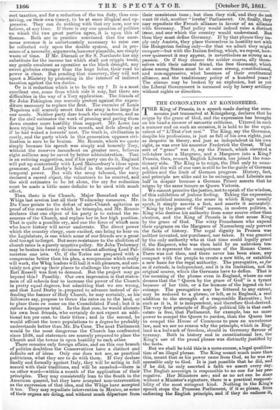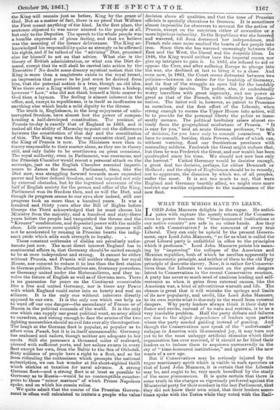THE CORONATION AT KONIGSBERG.
TiTKing of Prussia, in a speech made during the cere- nonies just transacted at Konigsberg, declares that he reigns by the grace of God, and the expression has brought on his head a shower of sarcastic criticism. Uttered in such a manner and on such an occasion, it is held to be the equi- valent of " L'Etat c'est nmi." The King, say the Germans, despite his professions, is just as full of his own rights, just as despotic in theory, and just as independent in his own sight, as was ever his ancestor Frederick the Great. What sort of " grace" was it, say the French, which elevated a toll-taker into a Margrave, and a Margrave into a King ? Prussia, then, remark English Liberals, has joined the reac- tionary side. The King is to reign, the Diet only to coun- sel, and the will of one man is still to be the guide of German politics and the limit of German progress. History, fact, and principle are alike said to be outraged, and Liberals are half in despair because a German Prince asserts that he reigns by the same tenure as Queen Victoria. We cannot perceive the justice, not to speak of the wisdom, of this exhibition of jealous feeling. Taking the expression in its political meaning, the sense in which Kings usually speak, it simply asserts a fact, and asserts it accurately. " King by the grace of God" means, in modern politics, a King who derives his authority from some source other than election, and the King of Prussia is in that sense King by the grace of God. The witty Frenchmen who expend their epigrams on the Hargrave of Nuremberg only pervert the facts of history. The regal dignity in Prussia was neither invented, nor purchased, nor taken. It was granted by the only authority who at that time could legally grant it, the Emperor, who was then held by an unbroken tra- dition to represent the omnipotence of the Roman Cfesar. There was not then, and there never has been since, any compact with the peOple to create a new title, or establish a new basis for the regal authority. The prerogative, so far as it extends, is independent, and it is its limitation, not its original source, which the Germans have to define. That is the meaning of the phrase even in England, where no one dreams that the " Queen by the grace of God" is a tyrant because of her title, or a foe because of the legend on her coinage. The prerogative may be fettered to any extent, may be reduced to a phrase, or left, as in England, a real addition to the strength of a responsible Executive ; but such as it is, it is independent, and therefore God-derived. The very first principle of English political life is that each estate is free, that Parliament, for example, has no more power to compel the Queen to pardon, than the Queen has to compel the House of Commons to pass an unwelcome law, and we see no reason why the principle, which in Eng- land is a bulwark of freedom, should in Germany flavour of tyranny. Both in history and in constitutional law, the King's use of the proud phrase was distinctly justified by the facts.
But we shall be told this is a mere excuse, a legal qualifica- tion of an illegal phrase. The King meant much more than this, meant that as his power came from God, so he was re- sponsible only to God. It is just possible that he did, and if he did, he only asserted a faith we assert every day. The English sovereign is responsible to no one for her pre- rogative. Her Ministers are; and as no act can be done without a Minister's signature, there is a practical responsi- bility of the most stringent kind. Nothing in the King's speech stops the Prussian Parliament, if it so please, from enforcing the English principle, and if they do enforce it, the King will remain just as before, King by the grace of God. But as a matter of fact, there is no proof that William the First meant anything of the kind. In the first place, the sentence objected to was never uttered to the people at all, but only to the Deputies. The speech to the whole people was a humble expression of pious feeling, and that we believe was the meaning of the former deliierance. The King ac- knowledged his responsibility quite as strongly as he affirmed his rights, and if he talked of the " advising" Diet, promised also for himself to act on that advice. What else is the theory of British administration, or what can the Diet de- mand, except that its will shall be carried into action by the Executive ? No doubt some dreamy mystical notion that the King is more than a magistrate exists in the royal breast, en impression that power to be just must be derived from him, that the paternal notion is a true, though an old idea. Was there ever a King without it, any more than a bishop, however " Low," who did not think himself a little nearer to God than a layman. The feeling is almost inherent in the office, and, except to republicans, is in itself as inoffensive as anything else which lends a mild dignity to the throne.
The truth is, Englishmen, in the long enjoyment of unin- terrupted freedom, have almost lost the power of compre- hending a half-developed constitution. The position of Prussia to-day is exactly that of England in 1665, and it tasked all the ability of Macaulay to point out the differences between the constitution of that day and the constitution of this. The King was then the real executive chief, just as the King of Prussia is now. The Ministers were then in theory responsible to their master alone, as they are in theory still, and only liable to be overthrown on great occasions. The royal authority, even in Parliament, was enormous, and the Prussian Chamber would resent a personal attack on the sovereign, just as the English Chamber resented imperti- nence to James the Second. Parliament, then, like the Diet now, was struggling forward towards more expanded power and better defined freedom, and was impeded not only by external obstacles, but by the ingrained reverence of the half of English society for the person and office of the King. Parliament won its freedom then, and so will the Diet, and though its progress seems to our eyes slow indeed, still our progress took us more than a hundred years. It was a hundred and thirty years after the Bill of Rights before George the Third acknowledged that he must choose his Ministry from the majority, and a hundred and sixty-three years before the people had vanquished the throne and the "Kreuzer" combination, and deposited power with the middle class. Life moves mere quickly now, but the process will not be accelerated by rousing in Prussian hearts the indig- nant pride which adds such strength to loyalty. • These constant outbreaks of dislike are peculiarly unfor- tunate just now. The most direct interest England has in continental affairs is, that Germany should be united enough to be at once independent and strong. It cannot be either without Prussia, and Prussia will neither change her royal House, nor consent to reduce it to less than the first station in German politics. The alternatives are, Germany powerless, or Germany united under the Hohenzollerns, and they in- volve the future of English as well as of German men. There is no guarantee for peace on the Continent conceivable like a free and united Germany, nor is there any Power with which England could enter into so hearty and real an alliance. It is the only one without interests directly opposed to our own. It is the only one which can help us to ward off our one danger—the ascendancy of France or of Russia in the political counsels of the world. It is the only one which can supply our great political want, an army allied to ourselves, and strong enough to face the armies of the two fighting monarchies should an evil fate ever ally them together. The laugh at the German fleet is popular, so popular as to affect even Punch, but it is in itself unreasonable. Germany has seaboard and sailors, though neither are adequate to her needs. Still she possesses a thousand miles of seaboard, pierced with sufficient ports, and her sailors swarm in every feet except her own, from the Baltic to the Sea of Okhotsk. Sixty millions of people have a right to a fleet, and so far from ridiculing the enthusiasm which prompts the national subscription, we can but wonder at the short-sighted thrift which stickles at taxation for naval advance. A strong German fleet—and a strong fleet is at least as possible to Germany as to Russia—would be no contemptible counter- poise to those " minor marines" of which Prince Napoleon spoke, and on which his cousin relies.
We quite admit that the course of the Prussian Govern- ment is often well calculated to irritate a people who value decision above all qualities, and that the tone of Prussian officials is specially obnoxious to freemen. It is sometimes impossible mpossible for observers to account for the action of Prussia, except on the suspicion either of cowardice or a more injurious imbecility. In the Republican war she hovered: and wavered, till Jena destroyed her independence, and French rule once more smelted the hearts of her people into iron. Since then she has wavered unceasingly between the East and the West, the liberal and the despotic ideas. In 1848, the King would neither have the imperial crown nor give up intrigues to gain it. In 1855, she refused to aid or oppose the Czar, and after suffering Europe to plunge into the war, she declined at last to bring it to a close. And even now, in 1861, the Court seems distracted between two policies—between its desire for the headship of Germany, and its fear of the struggle an open bid for the headship might possibly involve. The police, also, do undoubtedly worry travellers with great ingenuity, and use power as great as that of the French, with infinitely less discrimi- nation. The latter evil is, however, as patent to Prussians as ourselves, and the first effort of the Liberals, when strong enough to coerce the Upper House into action, will be to provide for the personal liberty the police so inces- santly menace. The political hesitancy arises almost en- tirely from the geographical misfortune of Prussia. " It is easy for you," said an acute German professor, "to talk of decision, for you have only to consult yourselves. We have to consult, besides, three Powers, either of which can, without warning, flood our frontierless provinces with marauding soldiers. Frederick the Great might endure that, but then he was Frederick the Great, and our wealth has been quadrupled since his time. We should not now lose only the harvest." United Germany would be decisive enough, a great deal too decisive, perhaps, for either Denmark or Holland ; and the object of Englishmen should be to remedy, not to aggravate, the disunion by which we, of all peoples, suffer the most. It is not too much to say, that were England and Germany heartily allied, we might once more restrict our warlike expenditure to the maintenance of the new fleet.































 Previous page
Previous page